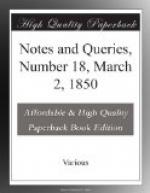“Lodginge of some of
the retinewe of the Lady Arbella and the
sayde Lorde Bysshoppe, viz.
Highgate xxs. and at Barnett viijs.,
in all xxviijs.
“Fyer lightes and other
nessces with the lodginge of the saide
Lorde Bysshoppe and some of
his servauntes at Highgate and
Barnett during the xvij dayes
aforesaide. xj_li._ xjs.
“Rydinge and postinge chardges, viz. for posthorses from Lambeth to Highgate xxxiiijs. iiijd. and from thence to Barnett xxxiiijs. ixd. Mr. Beeston and others for there chardges three several tymes to Barnett from London and from Highgate xljs. iiijd. the servauntes of the Lorde Bysshoppe of Durham sent at several tymes in the Lordes of the Councell and for other busynesses concerning this servyce xlvs. vjd. and to Sr. James Crofes Knight for the chardges of himselfe his men and horses from Monday to Wednesday night attendinge at London for this service xlijs. vijd., in all ix_li._ xviijs. vjd.
“Rewardes to sondrye psons, viz. to messengers sent from the Courte duringe the stay of the Lorde Bysshoppe at Highgate and Barnett xxxixs. vjd. Dyverse psons whoe tooke paynes at those twoe places vij_li._ xijs., vjd., given in the Yune for glasses broken and in rewardes to the meaner servauntes at Barnett xxxs., given to such an attended about the posthorses vijs. vjd. and in rewarde to one of the Tellors Clerkes whoe told and delivered the ccc_li._ and came to Durham House for the acquittance xxs., in all xij_li._, ixs. vjd.
“Money payde by the saide Lorde Bysshoppe pte of the ccc_li._ by him receaved to Nicholas Paye gen. whoe hath for the same yelded his accompte to the Kinges ma’tie. c_li._.—cclxiij_li._ viijs. viijd.
“Aud soe remayneth the some of xxxvj_li._ xjs. iiijd.
“Whiche some the saide Lorde Bysshoppe of Durham hath payde into the Kinges m’ts receipte of Th’excheq’r the vij’th daye of Februarie in the nynth yere of his highnes raigne as by the tallie thereof remayninge may appeare. And soe here Quyte.
“EX p FRA GOFTON
“Auditorem.”
* * * * *
THE NAME MARTEL.
I must confess that the article in No. 6. p. 86., which deprived Charles Martel of his long-possessed distinction of “the hammerer” gave me but little satisfaction. It was one of those old associations that one does not like to have destroyed. I could not, however, contradict your correspondents; and remained that very uncomfortable person, “a man convinced against his will.” On turning over my Menagiana, yesterday, I stumbled upon the name “Martel,” and, as the passage combines both your elements (being a good note, and producing a query) I beg leave to offer it to you.




